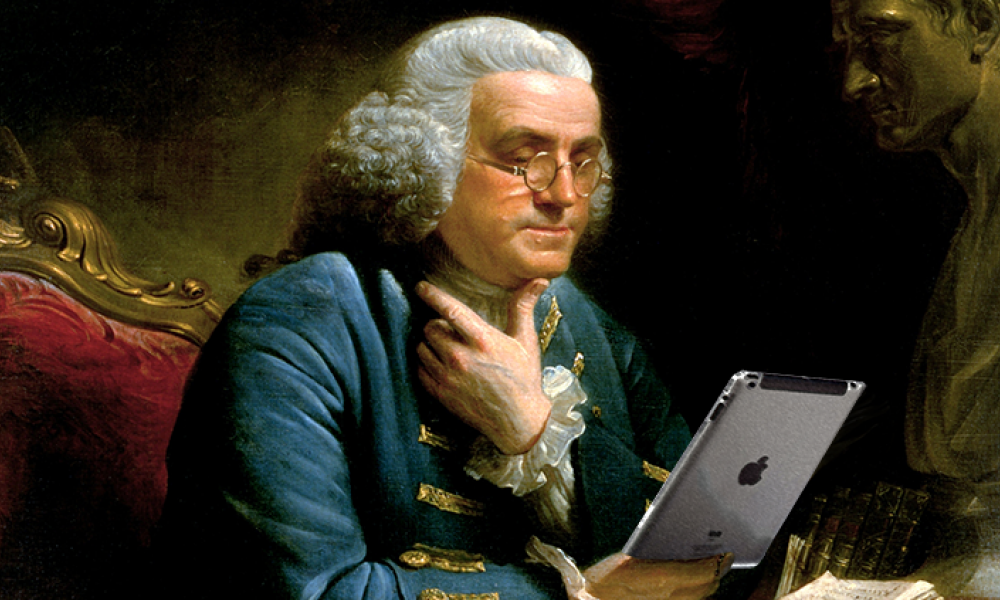Dr. Franklin, Citizen Scientist - Contextual Information

Benjamin Franklin (1706–1790) dedicated himself to research, invention, and sharing knowledge for the “benefit of mankind in general.” Franklin believed that all people could and should engage with science, and that science could transform society for the better. For these reasons, Franklin could be called America’s first citizen scientist.
Citizen, or community, science is a modern term that broadly refers to public participation in scientific research. It is science as practiced by nonprofessional scientists in collaboration with professional research teams. Free communication of results is fundamental to citizen science projects. People of all ages, abilities, and backgrounds can join in by volunteering their time to record and share local observations on topics of global importance. Citizen scientists believe that evidence-based science can be used to transform society for the better. In many ways, Benjamin Franklin expressed the values of a citizen scientist 200 years before the term came into use.
Franklin was committed to being useful to others and freely shared his inventions and ideas. As a citizen scientist, he addressed some of society’s most pressing issues, from maritime navigation and counterfeit currency, to smallpox epidemics and destructive electrical storms. Franklin approached scientific challenges by drawing on both his theoretical knowledge and practical experiences. He turned any available space into a laboratory, including homes, workshops, and ships. Controlled experimentation and careful observation characterized Franklin’s scientific practice. Franklin also created institutions that used science to benefit and educate others. However, he participated in a system of knowledge production that often reinforced and produced inequality.
In the 18th century, London was the scientific center of the British Empire. Colonists who desired to be taken seriously as scientists sought the recognition of London’s elite individuals and institutions. They sent letters describing their environment along with specimens—objects of scientific interest such as plants and animals—to contacts in England. Colonists imported books and scientific instruments to support their investigations. However, Europeans valued colonial North America more for its natural resources than the talents of the people who lived there.
Franklin participated in this transatlantic exchange of knowledge with great success. From Philadelphia, he built a network with connections on both sides of the Atlantic Ocean. As the first American-born colonist to receive international praise for his research, Franklin ensured recognition for American science.
His working-class origins and self-education distinguished Franklin from other elite scientists, known in the 18th century as natural philosophers. Franklin’s citizen science began in the home, where diverse people produced and exchanged useful knowledge. Household and trade sciences, often dismissed as the labor of women and tradespeople, shaped Franklin’s scientific practice even after he entered elite circles. His parents operated a soap- and candle-making business from their Boston residence. His mother-in-law, Sarah White Read, made medicines in their Philadelphia home where he and Deborah ran a press. All of these sciences turned his homes into laboratories and inspired his inventions. Franklin also used his Philadelphia, London, and Paris residences as scientific gathering places. The members of the Franklin households, including enslaved people, enabled his success. Because of his background, he recognized that science could take many forms and that all people could produce useful knowledge.
In his youth, Franklin sought patrons to support his early scientific work. Patrons enabled scientists to conduct and publish their research by providing money, supplies, and access to scientific networks. Institutions such as the Royal Society of London and the French Royal Academy of Sciences were patrons for the advancement of knowledge. Wealthy supporters acted for personal glory, as they would be celebrated in resulting publications. This system favored educated, white men who could work within business and political networks to meet sponsors. Those who lacked connections due to their social status, including most women, men of the working classes, enslaved people, and Indigenous peoples, produced useful knowledge without support or recognition. Remembered as a singular genius, Franklin worked closely with family, friends, and enslaved members of his household. Operating within a society that privileged knowledge produced by elite white men, many of Franklin’s collaborators and sources went uncredited.
Nevertheless, Franklin remained committed to advancing useful knowledge for “the Benefit of Mankind in General” even as his responsibilities as a public servant demanded more of his time. He believed that “there is no Rank in Natural Knowledge of equal Dignity and Importance with that of being . . . a good Neighbour or Friend, a good Subject or Citizen.” Franklin applied his privileged position to civic improvement by founding or patronizing institutions that promoted research and education, empowering the next generation of American citizen scientists. Many of these institutions still exist today, including the American Philosophical Society, the Library Company of Philadelphia, Pennsylvania Hospital, and the University of Pennsylvania. Yet in his lifetime, the vast majority of people who benefited were elite, white men. When Franklin died, his work as a citizen scientist had made him the most recognizable American in the world. He had risen above his working-class origins and counted presidents and kings among his friends.
Franklin’s spirit of inquiry and legacy of civic improvement continue at the APS today. The APS remains committed to the belief that the pursuit of useful knowledge is inherently in the public interest and therefore essential to society. The APS continues to elect distinguished scientists, humanists, and leaders in civic and cultural affairs to Membership, and engages Members through annual Meetings. APS grants, fellowships, lectures, publications, and prizes encourage groundbreaking research, discovery, and public engagement.
Written by Dr. Janine Boldt, Andrew W. Mellon Foundation Postdoctoral Curatorial Fellow, with the assistance of Mike Madeja, Head of Education Programs
